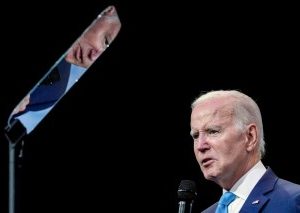
The tumult in Russia will take time to sort out, but whatever happens is certain to reverberate in a 2024 presidential race that will offer a referendum of sorts on President Joe Biden’s attempt to defang Russian President Vladimir Putin.
Biden’s support for Ukraine as it tries to beat back Russia’s invasion appears to have helped weaken Putin’s grip on power. The war has turned into a blood-soaked slog that has sparked dissent from the Wagner mercenary force, culminating in the recent armed rebellion against Russia. The immediate crisis has abated for now, but events are still fluid, and the outcome will prove a defining test of Biden’s foreign policy decisions in the Russia-Ukraine war.
A year ago, Biden gave an unvarnished glimpse into his thinking about Putin. “For God’s sake, this man cannot remain in power,” he said during a trip to Poland.
Today, Biden may be closer to getting his wish. And he played some part by supplying Ukraine with advanced weapons and rallying NATO allies in Ukraine’s behalf.
Putin “is definitely weaker today than he was 24 hours ago. His armed forces, which used to be all his armed forces, were threatening to fight each other,” Michael McFaul, a former U.S. ambassador to Russia, said in an interview Saturday as the drama inside Russia unfolded.
Referring to Yevgeny Prigozhin, the head of the Wagner mercenaries, he said that Putin “went on TV and told the Russian people that Prigozhin was a traitor, and now he’s dropping the charges and allowing him to go to Belarus. That’s a very weak sign.”
“It’s been a pretty rough day for Mr. Putin,” McFaul added.
Biden allies are already touting his handling of the war as proof that he can competently manage a fast-moving, high-stakes crisis involving a nuclear-armed state. Biden spent much of the weekend hunkered down at the presidential retreat at Camp David, Maryland, attending briefings about Russia and conferring with his counterparts in France, Germany and the United Kingdom. He also spoke Sunday to Ukrainian President Volodymyr Zelenskyy, who tweeted that the pair “discussed the course of the hostilities and the processes taking place in Russia.”
Biden has given no public statement in the belief that Putin would point to anything he said as proof that the White House was orchestrating the uprising, a White House official said, speaking on condition of anonymity to talk freely.
If nothing else, Biden has shown the sort of stability that his past and present rival, Donald Trump, seldom displayed in four years as commander-in-chief, Biden’s allies said.
“This is yet another moment where I am so grateful that our president is a seasoned global leader who has spent 50 years working in foreign policy and thus has the wisdom not to tweet or speak or act in a way that could distract or give Putin the excuse that this is somehow a U.S. or NATO scheme,” Sen. Chris Coons, D-Del., a member of the Foreign Relations Committee, said in an interview.
Trump has been arguing a counterfactual: that if he were still president, Putin would have been deterred from invading Ukraine and the war would never have happened.
There’s no way to prove that point, of course, just as there’s no way to gauge whether Trump would make good on his off-stated claim that he could end the war in 24 hours if he were back in the White House. He has suggested he’d achieve a quick end to the war by negotiating directly with Putin and Zelenskyy and driving a tough bargain with each.
What’s unclear is whether a peace deal brokered by Trump would be fair to all sides. When he was in office, Trump sought to befriend Putin, and he was impeached over his alleged attempt to pressure Zelenskyy to investigate Biden.
“Conceivably, he would let Putin win in Ukraine and do further damage to American interests by going after our NATO allies in Eastern Europe,” said John Herbst, who was the U.S. ambassador to Ukraine during the George W. Bush administration.
If Putin feels cornered, he’s apt to take more risks and become more dangerous, potentially testing Biden’s diplomatic skills as the presidential race consumes more and more of his time.
Alternatively, if Putin is deposed and a scramble for power ensues, Biden might face the prospect that Russia’s nuclear stockpile could slip from the existing government’s control. That presents a scary scenario — one that has made some Biden administration officials apprehensive about a post-Putin Russia, a former senior U.S. foreign policy official said.
“What concerns me — and I have talked to folks in the administration — is that they’re extremely anxious,” said Alexander Vindman, who was the director of European affairs for the Trump White House’s National Security Council. (Vindman famously testified in the House’s 2019 impeachment inquiry.)
“All these conceptual fears about what happens when Russia collapses now becomes quite a bit more real. And the knee-jerk reaction from an administration that has been consistently reluctant and reactive may be to say, ‘How do we take down the temperature and not have upheaval in Russia?’ The problem is that’s an impossibility. Ukraine will not relent based on pleas from the United States.”
The Biden administration has done “plenty of good things, don’t get me wrong,” Vindman continued. “And God bless that it’s them in charge instead of a Trump administration. But they’ve not been superb on this.
“I’m a little bit concerned that they’ll draw the wrong conclusion that somehow they can exercise control over this thing when they can’t. They just need to roll with it.”
Source – NBC News


Share your thoughts